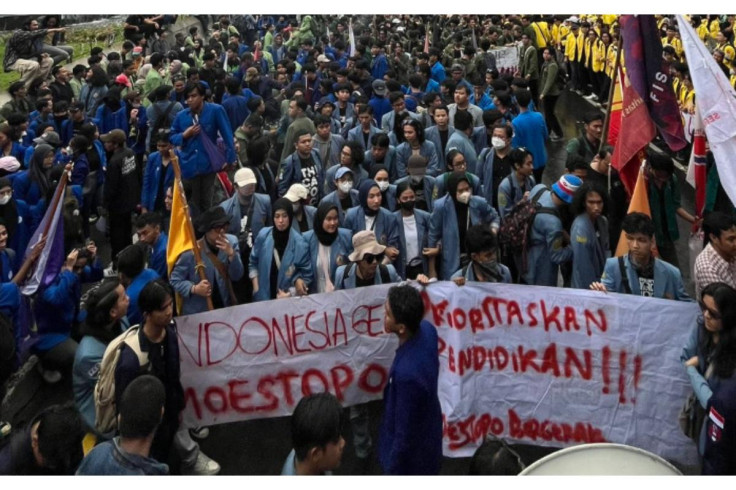Indonesia Protests 2025: Why Anti-Government Uproar Is Happening And Why The World Is Watching
Demonstrations over inflation, corruption, and inequality have spread across Indonesia, leaving at least six people dead

Indonesia, Southeast Asia's largest democracy and economy, is experiencing some of its most serious unrest in years. Demonstrations have erupted across major cities, fuelled by economic hardship, political grievances and allegations of police brutality.
The immediate trigger was the death of 21-year-old motorcycle taxi driver Affan Kurniawan, who was struck and killed by a police vehicle during a protest on 28 August. Video of the incident spread quickly online, turning Affan into a symbol of state violence and further mobilising students, workers and labour unions.
Why Indonesians Are Protesting Now
Public anger has been building over rising inflation, mass layoffs, higher property taxes and a controversial housing allowance for members of parliament worth nearly ten times Jakarta's minimum wage. Promised wage increases and anti-corruption reforms have yet to materialise, fuelling frustration among working-class communities, Al Jazeera reported.
Affan's death became the tipping point. Protesters are now calling not only for the removal of parliamentary perks but also for the resignation of senior police officials, salary increases tied to inflation and stronger anti-corruption measures, according to the Associated Press.
From Marches To Nationwide Unrest
What began as student-led marches outside parliament quickly escalated into violent clashes. Police deployed tear gas and water cannons, while protesters torched a five-storey building near Jakarta police headquarters and targeted the homes of political figures in cities such as Bandung and Surabaya.
The demonstrations have since spread far beyond the capital, reaching Surabaya, Yogyakarta, Medan, Makassar, Manado, Bandung and Papua's capital, Manokwari. The scale of the unrest highlights that dissatisfaction is not confined to one region but reflects wider discontent across the country.
At least six people have been killed so far. In addition to Affan, three people were killed when a regional parliament building in Makassar was set ablaze, while two others died in separate incidents. Infrastructure damage has been extensive, worsening pressure on local economies, according to Reuters.
STAY‼️
— I.N 아이엔 INDONESIA🇮🇩 (@yangjeonginID) August 31, 2025
the situation in Indonesia is very serious and has been escalating quickly. Protests that began on August 25 have turned violent, with significant damage and even casualties reported
Here’s more information 👇 pic.twitter.com/4eTEHtD0H8
🇮🇩 Indonesia is in chaos as anti-govt protest intensifies:
— Indo Affairs (@indoaffair) August 31, 2025
- Demonstrators clashed with security forces, set vehicles ablaze
- Residence of the Finance Minister looted
- President cancelled his China trip
- Reason reported to be additional housing allowance for parliamentarians pic.twitter.com/129o4HLD6E
🇮🇩#Indonesia🚨Across the Globe : +250 Signatories Condemn State Violence and Demand Accountability for Indonesian Civilians 🚨#StopPoliceBrutality pic.twitter.com/GgH2PCJnK3
— KontraS #StopGenocide🍉 (@KontraSupdates) August 31, 2025
Government Response And International Concerns
President Prabowo Subianto's administration, which took office in 2024, is now confronting its most serious political test. The government has pledged to revoke parliamentary allowances, suspend overseas trips for MPs and launch an investigation into Affan's death. Whether these measures will be enough to quell public anger remains uncertain.
The unrest has already affected financial markets. Indonesia's stock exchange has fallen, the rupiah has weakened and consumer confidence has declined—developments that have concerned international investors and development banks.
Indonesia's position as a key member of ASEAN makes its stability critical to regional security and trade. Analysts told the Financial Times that countries including Australia, China and the United Kingdom are closely monitoring developments, concerned about potential impacts on economic partnerships and regional stability.
What Comes Next
The protests reflect more than outrage over a single incident. They represent deeper frustrations with inequality, governance and accountability in the world's fourth most populous nation.
With six lives lost, property destroyed and demonstrations continuing nationwide, Indonesia faces a test of both leadership and public patience. The government's concessions may ease immediate tensions, but the scale of mobilisation suggests that many Indonesians are demanding reforms. International observers, meanwhile, are watching closely to see whether the unrest marks a passing crisis or the start of a more profound reckoning.
© Copyright IBTimes 2025. All rights reserved.





















